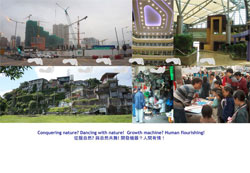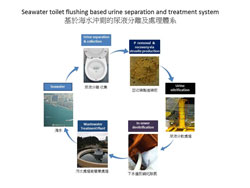Two leading scholars have been invited to deliver public lectures on Sustainable Built Environment organized by the Research Grants Council with the Hong Kong Science Museum on 26 July 2014 (Saturday). Details of the lectures are as follows:
| Topic | Speaker | Time |
|---|---|---|
| Pathways towards a Sustainable Built Environment | Prof Mee Kam NG (Department Vice-chairman, Department of Geography and Resources Management, The Chinese University of Hong Kong) | 2:30 pm - 3:30 pm |
| Urine holds the key to the cities of the future | Prof Guang-Hao CHEN (Professor, Department of Civil and Environmental Engineering, The Hong Kong University of Science and Technology) | 3:30 pm - 4:30 pm |
Venue: Lecture Hall, Hong Kong Science
Museum (Location
Map)
Language: Cantonese
Free admission on a first-come, first-served
basis.
For enquires, please contact us at 2524
3987 or rgc@ugc.edu.hk.
First Session
Topic: Pathways towards a Sustainable Built
Environment
Speakers: Professor Mee Kam Ng
Time: 26 July 2014 (Saturday) 2:30pm - 3:30pm
|
Brief introduction: Typical modern 'development' razes nature and communities to accommodate economic growth. A sustainable built environment, however, dances with, rather than conquers nature. The built form is developed to highlight the natural landscape, enhancing its various ecological functions. To be truly sustainable, the built environment should be designed and planned to nurture communities, fostering healthy and resilient human relationships that in turn add character to enrich a place. Building a sustainable environment requires a vision that goes beyond 'mere growth' - it is a challenge, an exploration and a learning process for people to live harmoniously with one another in nature in the long run. Hence, various physical infrastructures in cities need to be designed to accommodate natural changes in the ecosystem, to minimize resource consumption and to bring back biodiversity to the urban realm. These require new skills, inspire new ways of managing urban living and provide new job opportunities at the local level. Local economic activities are essential to sustain the livelihood of individuals and families in neighbourhoods and communities, an important part of sustainable social development. Economically secured families are the fundamental building blocks of cohesive community. The art of place-making, producing a built environment that is accessible, sociable, comfortable, enjoyable, entertaining and full of life and activities, helps strengthen such communities and the long-term sustainability of a place. Such nature-cum-people-centred development calls for a fundamental re-conceptualization of the relationships between 'economic growth' and 'long-term development'. It challenges 'growth machine' institutions to also practise joined-up holistic thinking in the development process - to tackle multiple problems, to achieve multiple purposes through creative and out-of-the-box solutions that adhere to the fundamental principles of respecting nature and nurturing human relationships. About the Speaker: Mee Kam Ng is Vice-Chairman of the Department of Geography and Resource Management, the Director of the Urban Studies Programme, Associate Director of the Institute of Future Cities and the Hong Kong Institute of Asian Pacific Studies at the Chinese University of Hong Kong. She is a member of the Royal Town Planning Institute, a fellow of the Hong Kong Institute of Planners and academic advisor of the Hong Kong Institute of Urban Design. She has completed over 20 research projects and published widely on planning, governance and sustainability issues in Pacific Asia. Her publications have earned her six Hong Kong Institute of Planners' Awards. She has delivered over 20 international speeches and 55 local presentations, including four public lectures in the Central Library. At the international level, she has been consultant to the United Nations, the European Union and the Municipal Government of Shenzhen. She is an associate editor for the Current Research on Cities supplement section of the Elsevier Ltd journal "Cities" and a member of the editorial board of Town Planning Review, Planning Theory and Practice, DisP - The Planning Review and City, Culture and Society, and Business Strategy and the Environment. |
 |
Second Session
Topic: Urine holds the key to the cities
of the future
Speaker: Professor Guang-Hao Chen
Time: 26 July 2014 (Saturday) 3:30pm - 4:30pm
|
Brief introduction: Water is an important resource that is vital to all living creatures on earth. The availability of clean water is the key to the development of civilization. However, with the world's ever-increasing population and urbanization, huge amounts of domestic wastewater are produced every minute. This is causing serious problems (e.g. eutrophication, toxic algae blooms) for aquatic environments worldwide due to the high content of nitrogen, phosphorus and other nutrients in wastewater, thus greatly limiting the availability of water as a resource. Unfortunately, conventional centralized wastewater treatment cannot meet the requirements of the rapidly expanding cities due to its limited capacity. In addition, its low recovery rate leads to the waste of precious resources. Recent studies have found that the majority of nutrients in wastewater actually come from urine. In fact, urine contributed 80% of nitrogen and 50-80% of phosphorus in domestic wastewater although it accounts for less than 1% of the total volume. Separating urine from other wastewater streams at the source and treating them independently could thus greatly improve the efficiency of downstream wastewater treatment by lowering the nutrient loading. On the other hand, the separated urine, as a concentrated nutrient solution, can be directly applied in agriculture as a fertilizer or it can be used for resources recovery. Urine separation and its related treatment processes have been recognized as the future of domestic wastewater treatments.
This lecture aims to introduce the public to the significance, necessity, and practical potential of urine separation, and the research advances that have been made in this area. It will also discuss the impacts of urine separation on our daily lives and city developments. In addition, the lecture will introduce a novel urine separation, treatment and resources recovery system developed by researchers at the Hong Kong University of Science and Technology. This system integrates the concept of seawater toilet flushing with the high population density of high-rise buildings, as in Hong Kong. About the Speaker: Dr GH Chen obtained his PhD degree in Environmental Engineering from Kyoto University in 1990. He worked in Japan and Singapore before joining HKUST in 1995. Dr Chen is currently Professor of Civil and Environmental Engineering and Coordinator of the Civil and Environmental Engineering Program at HKUST. He also serves as Deputy Director of the HKUST Institute for the Environment and Director of the Wastewater Treatment Lab at the Fok Ying Tung Research Institute of HKUST in Guangzhou. He is an internationally recognized leading researcher in water science and technology. His major research expertise includes sewage treatment, urban water recycle and reuse and surface water quality control. Over the past 10 years, he and his research team have developed about 12 patented wastewater treatment technologies, including the well-known SANI process. |
 |